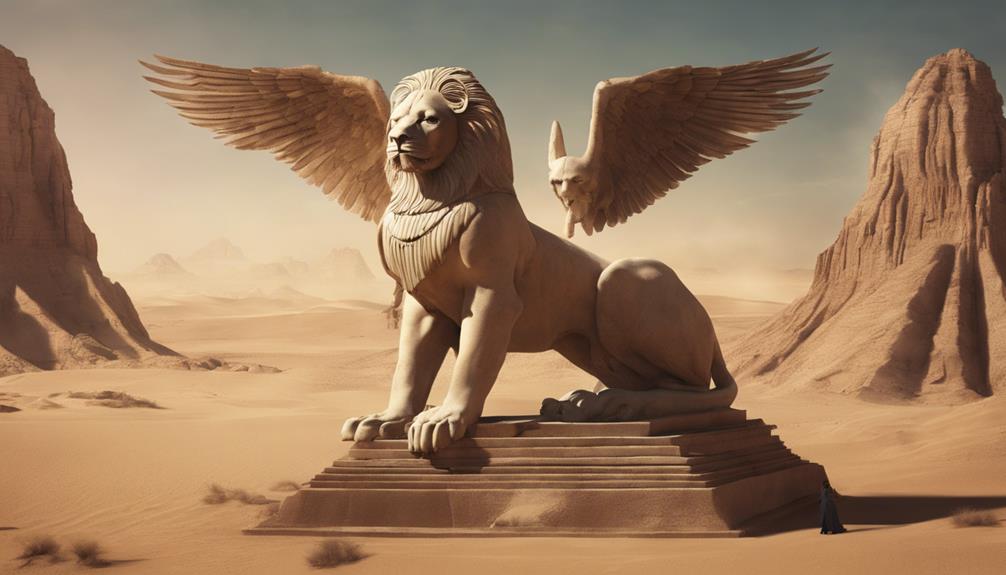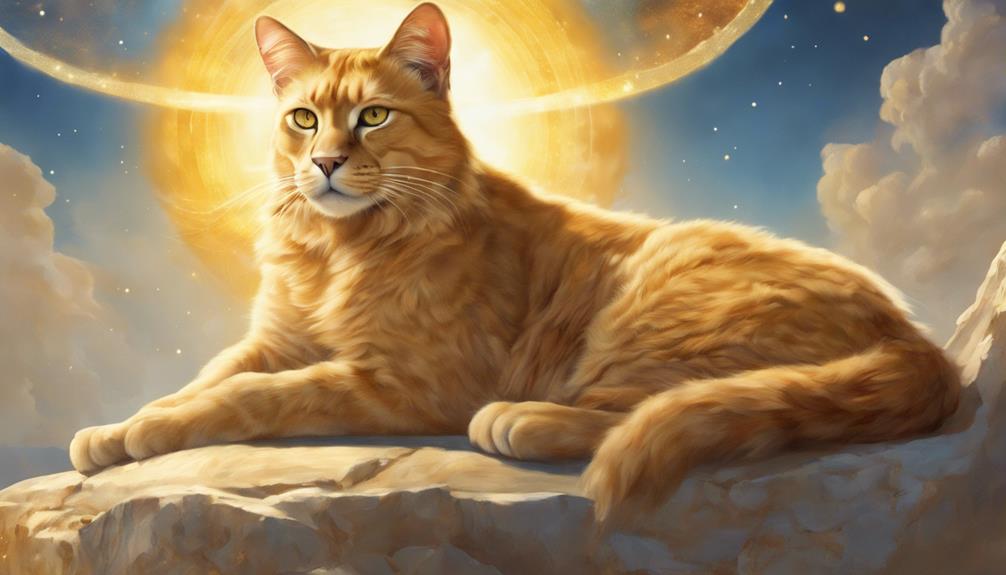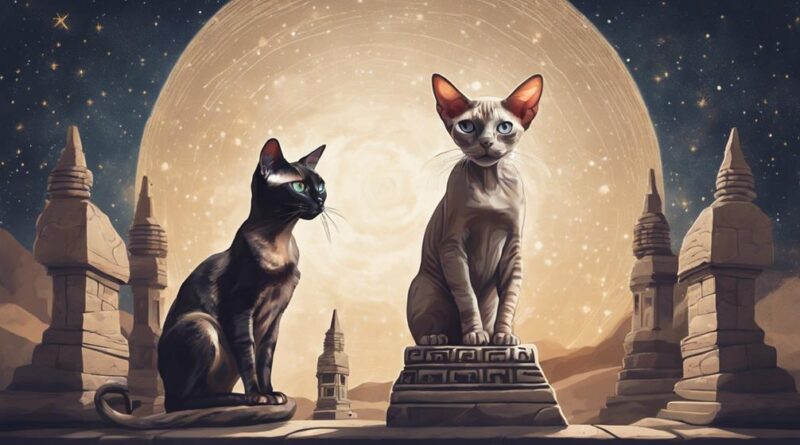9 Best Ancient Greek Myths About Cats
Discover the intriguing ancient Greek myths featuring clever felines like the one who outsmarted Zeus. Uncover the divine connections between cats and deities such as Artemis and Bastet. Learn about Ailuros, the revered protector, and the mysterious encounters between cats and gods like Dionysus and Hermes. Explore the enigmatic tales of Sphinx, Hecate's enigmatic gifts, and Apollo's majestic feline companion. Each myth unveils the unique bond and significance of cats in Greek mythology. Unravel the captivating stories that blend cunning, grace, and wisdom, showcasing the mystical allure of these ancient feline companions.
The Cat Who Outwitted Zeus
In the ancient Greek myth, a clever cat managed to outwit Zeus, the king of the gods, through cunning and quick thinking. Zeus, known for his trickery and power, was left astounded by the feline's wisdom and intelligence. The cat, with its feline cunning, devised a plan that led to Zeus's divine defeat.
It all began when Zeus, in his arrogance, challenged all creatures to a contest of wits. Many animals shied away from the challenge, fearing the wrath of the mighty god. However, the cat, with its sharp mind and keen senses, saw an opportunity to prove its worth. When the day of the contest arrived, Zeus presented a series of intricate riddles that seemed impossible to solve. Yet, the cat approached each puzzle with a calm demeanor, carefully analyzing the questions and offering solutions that baffled even the king of the gods.
Zeus, accustomed to always being one step ahead, found himself outmatched by the cat's strategic thinking. In a surprising turn of events, the feline's cleverness proved to be a formidable adversary to Zeus's usual tactics. The cat's victory not only showcased its intelligence but also served as a reminder that wisdom can come from the most unexpected places.
Artemis and the Sacred Feline
Artemis, the revered goddess of the hunt and wilderness, held a special bond with the sacred feline that roamed her sacred groves. Cats were more than just animals to her; they were symbols of her connection to the natural world and her fierce independence. Here's why this bond was so special:
- Symbolism of Cats: Artemis's connection to cats ran deep, symbolizing her own qualities. Like cats, she was agile, elusive, and fiercely protective of her domain. The graceful movements of cats mirrored her own fluidity in the wild.
- Divine Companions: Cats were considered divine companions to Artemis, walking alongside her as she roamed the forests. Their silent but watchful presence added an aura of mystery and wisdom to her surroundings, enhancing her connection to the spiritual realm.
- Ancient Rituals: In ancient rituals dedicated to Artemis, cats played a significant role. They were often present during ceremonies honoring the goddess, believed to bring blessings and protection to those who worshipped her faithfully.
- Guardians of the Grove: These sacred felines were seen as guardians of Artemis's groves, protecting the sanctity of her sacred spaces. Their keen senses and swift reflexes were a testament to their role as protectors of all that Artemis held dear.
The Tale of Ailuros the Protector
The legend of Ailuros, the revered guardian cat, weaves a tale of loyalty and courage in the face of peril. Ailuros' legacy transcends time, leaving a lasting impact on the perception of modern cats. In ancient Greece, cats held significant symbolism, often associated with traits such as cunning, protection, and independence, all of which Ailuros embodied magnificently.
Ailuros was believed to possess a mystical connection to the divine, a representation of grace and strength. The tale of Ailuros the Protector revolves around the cat's unwavering commitment to safeguarding her human companions from harm. Her piercing gaze and swift reflexes made her a formidable guardian, instilling fear in any who dared to threaten those under her watchful eye.
In ancient Greek culture, cats were revered for their ability to navigate the realms of the physical and spiritual worlds with ease. Ailuros, with her mysterious aura and silent footsteps, epitomized this dual nature, becoming a symbol of protection and wisdom. Even today, modern cats are often seen as enigmatic creatures, embodying the essence of their ancient ancestors.
The story of Ailuros serves as a testament to the enduring legacy of cats in mythology, highlighting their role as both companions and protectors throughout history. The bond between humans and felines, forged in the annals of ancient Greece, continues to thrive, a testament to the timeless connection between two seemingly disparate species.
Dionysus and the Cat's Grace
Dionysus's encounter with the cat revealed a hidden aspect of feline grace that mesmerized those who witnessed it. The graceful movements of the cat symbolized a deeper connection to the divine that Dionysus himself embodied. Here are four emotional aspects that highlight the significance of Dionysus and the Cat's Grace:
- Enchantment: The sight of Dionysus surrounded by his feline followers evoked a sense of enchantment, as the graceful cats moved in harmony with the god of wine and ecstasy. The bond between Dionysus and the cats seemed otherworldly, emphasizing the mystical nature of their relationship.
- Majesty: The behavior of the cats in Dionysus's presence exuded a majestic aura, reflecting the graceful and regal qualities often associated with both the god and the feline creatures. Their movements were a testament to the elegance and power that permeated the mythological realm they inhabited.
- Elegance: The gracefulness of the cats in this myth highlighted the elegance that's inherent in their nature. As they moved with fluidity and poise, they embodied the beauty and sophistication that have long been admired in feline beings.
- Mystery: The encounter between Dionysus and the cats held an air of mystery, hinting at deeper symbolic meanings yet to be fully understood. The enigmatic nature of their interaction left observers in awe, pondering the secrets hidden within the graceful dance of the feline creatures.
Bastet's Influence in Greece
Exhibiting a profound influence on Greek culture, Bastet's presence in ancient Greece emanated a sense of feline grace and mystical allure that captivated both mortals and gods alike. The worship of Bastet, the Egyptian goddess of cats, found its way into Greece through trade and cultural exchanges, leaving a lasting impact on Greek society. Greek influence can be seen in the adoption of Bastet's image in various artistic depictions, where she was often portrayed as a cat-headed woman, symbolizing protection, fertility, and elegance.
Bastet's worship in Greece wasn't merely a replication of Egyptian practices but a fusion that blended Egyptian mysticism with Greek beliefs. The Greeks, known for their incorporation of foreign deities into their pantheon, welcomed Bastet into their religious landscape, attributing to her qualities that resonated with their own values. As a symbol of grace and independence, Bastet's influence extended beyond religious ceremonies, seeping into everyday life where cats became revered and cherished companions in Greek households.
The Greek influence on Bastet's worship can also be observed in the tales and myths that intertwined Hellenistic elements with Egyptian traditions. Stories of Bastet's encounters with Greek deities like Artemis and Apollo highlighted the interconnectedness of different pantheons, showcasing how beliefs transcended borders, enriching the tapestry of ancient mythology. Through Bastet, Greece found a connection to the mystique of Egypt, weaving a narrative that celebrated the enigmatic allure of feline grace in both cultures.
Hermes and the Mysterious Cat
In the realm of ancient Greek myths, Hermes encountered a mysterious cat whose presence stirred whispers of unseen realms and enigmatic wisdom. This feline, with eyes that seemed to hold the secrets of the universe, captivated Hermes, known for his mischief and quick wit. As the messenger of the gods, Hermes was drawn to the cat's aura of mystery and charm, leading to a unique interaction that would echo through the annals of myth.
The cat's fur shimmered like moonlight, hinting at a connection to the divine and the ethereal, leaving Hermes in awe of its otherworldly beauty.
Its purrs resonated with a melody that seemed to unlock forgotten knowledge, stirring a sense of longing within Hermes for the wisdom that the cat possessed.
Hermes, intrigued by the cat's enigmatic gaze, found himself questioning his own understanding of the world, pondering the depths of existence and the mysteries that lie beyond mortal perception.
The encounter between Hermes and the mysterious cat symbolized a union of cunning intellect and ancient wisdom, blending the god's mischievous nature with the feline charm that transcends time and space.
The Sphinx: Guardian of Secrets

Guarding the secrets of the ancient world with a vigilant gaze, the Sphinx looms as an enigmatic figure in Greek mythology, its riddle-laden presence shrouded in mystery and wisdom. The Sphinx, often depicted as a creature with the body of a lion and the head of a human, played a crucial role in the lore of ancient Greece. One of the most famous aspects of Sphinx mythology is its penchant for posing riddles to travelers, with a reputation for devouring those who couldn't solve its enigmas.
The most well-known of the Sphinx riddles was the question: 'What walks on four legs in the morning, two legs in the afternoon, and three legs in the evening?' Oedipus, the legendary hero, managed to answer correctly by stating that it was a human being, as they crawl as a baby, walk upright in adulthood, and use a cane in old age. The Sphinx, defeated by Oedipus' intelligence, met its demise, showcasing the power of wit over brute strength in Greek mythology.
The Sphinx's role as the guardian of secrets symbolizes the importance of knowledge and critical thinking in overcoming challenges. Its legacy endures as a reminder of the value of wisdom and cleverness in navigating the complexities of life, making it a timeless symbol in Greek mythology.
The Cat's Gift to Hecate
With a cryptic grace, the feline creature bestowed an enigmatic offering upon Hecate, weaving threads of mystery and magic into the realm of ancient Greek myths. Hecate, the goddess of magic, witchcraft, and the night, was often depicted with her loyal companion, a magical feline who held a special place in her heart. The cat's gift to Hecate symbolized the deep connection between the mystical goddess and her otherworldly companion.
Here are four key emotions evoked by the cat's gift to Hecate:
- Intrigue: The mysterious nature of the feline's offering left Hecate and all who witnessed the exchange captivated by its enigmatic charm.
- Awe: The magical essence imbued in the gift filled those present with a sense of wonder and reverence for the bond between Hecate and her companion.
- Euphoria: The gift brought a surge of joy and delight to Hecate, illuminating her divine features with a radiant glow of happiness.
- Respect: The act of the feline presenting a gift to Hecate underscored the mutual respect and admiration that existed between the goddess and her loyal companion, solidifying their partnership in the realm of ancient Greek mythology.
The cat's gift to Hecate stood as a testament to the profound relationship shared between the goddess of magic and her mystical feline companion, forever enshrined in the annals of Greek myth.
Apollo's Feline Companion

Apollo's feline companion, known for its grace and agility, moved in harmony with the god of the sun, embodying a symbiotic relationship that illuminated the ancient Greek myths. This loyal companion of Apollo wasn't an ordinary feline; it possessed divine feline powers that set it apart from any other creature in Greek mythology. The cat's connection to Apollo went beyond mere companionship; it symbolized the intertwining of grace, strength, and mystical abilities.
In ancient Greek tales, Apollo's feline companion was often depicted as a creature of beauty and mystery. Its sleek fur shimmered like gold under the sun's rays, mirroring the radiant presence of the god himself. The cat's eyes held a mesmerizing gaze, reflecting the wisdom and foresight associated with Apollo's domain of prophecy and truth.
This divine feline not only shared Apollo's physical attributes but also his characteristics of swiftness and cunning. In myths, the cat was portrayed as a creature capable of moving with unparalleled speed and agility, mirroring Apollo's own nimbleness and quick reflexes. Together, they formed a formidable duo, embodying the balance between light and shadow, order and chaos.
Frequently Asked Questions
Were Cats Considered Sacred in Ancient Greek Mythology?
In ancient Greek mythology, cats were considered sacred creatures, playing a significant role in their religious beliefs and practices. Greek feline symbolism often associated these animals with protection, mystery, and independence.
Cats were believed to have a connection with the divine and were revered for their unique qualities. Their presence in various myths and rituals highlighted their importance in the ancient Greek culture and mythology.
How Did Cats Come to Be Associated With Specific Gods and Goddesses?
Cats as divine companions often appear in Greek myths, symbolizing traits like independence, mystery, and protection. Feline symbolism in myths highlights their connection to various gods and goddesses. Through tales of transformation or guidance, cats became intertwined with deities like Artemis, Bastet, and Dionysus.
Their presence in these stories reflects the reverence and significance ancient Greeks placed on these creatures as symbols of divine qualities and companionship.
Did Ancient Greeks Believe Cats Had Special Powers or Abilities?
Ancient Greeks believed cats had special powers and abilities, influencing superstitions and their role in folklore. These feline creatures were seen as mysterious and connected to the supernatural realm. Many believed they could see beyond the physical world and had a deep understanding of hidden truths.
Cats were often associated with witches and magic, adding to their mystique and importance in ancient Greek society.
Were There Any Specific Rituals or Ceremonies Involving Cats in Ancient Greece?
In ancient Greece, cat worship held historical significance as part of religious practices. Cats were revered for their feline symbolism and were sometimes included in rituals or ceremonies.
Offerings were made to these graceful creatures, seen as sacred beings. Their presence was believed to bring luck and protection.
The ancient Greeks honored cats for their mysterious nature and grace, incorporating them into various aspects of their religious beliefs and practices.
What Symbolic Meanings Did Cats Hold in Ancient Greek Culture?
In ancient Greek culture, cats held significant symbolic significance. They were often associated with various cultural beliefs, such as mystery, intelligence, and independence.
Cats were seen as creatures with a strong connection to the spiritual world, embodying qualities like agility and grace. Their presence in myths and folklore further solidified their role as mystical beings in ancient Greek society.
Cats were revered for their enigmatic nature and perceived as guardians of hidden knowledge.
Conclusion
In conclusion, ancient Greek myths about cats not only highlight the significance of these feline creatures in their culture but also illustrate their cunning, grace, and protective qualities.
From outwitting Zeus to being companions of gods like Apollo and Hermes, cats play various roles in these captivating stories.
Their presence in Greek mythology serves as a reminder of the mysterious and awe-inspiring nature of these beloved animals throughout history.
